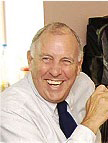

Journalist
Chris Forrester.
Journalist Chris Forrester of Advanced TV is reporting at the news infosite that two U.S. senators, one from each side of the aisle, have written to the FCC’s chairman Ajit Pai asking that the agency exercise caution as to how the proposed C-band restructuring is handled.
The letters were authored by Jerry Moran (R-Kansas) and Tom Udall (D-New Mexico).
“As part of its proceeding, the FCC must consider whether sufficient spectrum will remain available to accommodate today’s C-band services, whether other transmission capacity could provide an equally reliable, available, affordable and resilient alternative, whether new uses of the band could result in harmful interference to existing services, and how to reimburse C-band earth station operators for costs incurred.”
The C-Band Alliance has already stated, unequivocally, that they will fund the costs of the reallocation and also move existing clients to other, suitable frequencies.
However, the senatorial letters received support from the National Association of Broadcasters, and others. They wrote in a joint statement,: “NAB, NCTA, American Cable Association and National Public Radio thank Senators Jerry Moran (R-KS) and Tom Udall (D-NM) for their leadership on this critical issue of spectrum management, recognizing the importance of protecting existing C-band users as Congress and the FCC consider changes to the C-band.

Forrester is also reporting that the past few weeks has seen more than a few commentators suggest that OneWeb, the proposed ‘mega-constellation’ of an initial 648 satellites, is in trouble.
They have suggested the cash needed to finance the operation is not going to happen, or the satellites are costing far more than originally envisaged, that launch dates have slipped, too many CEO changes (4) and that there’s too much focus on the building and launching and not enough — if any — on marketing and sales of services.

OneWeb's Founder,
Greg Wyler.
Greg Wyler, founder of OneWeb firmly rebuts those doomsayers in a recent interview and was candid and admitted that there were plenty of things to worry about. He admitted that the launch plans have slipped but that the [first batch of] satellites are being tested and that their performance was better than expected. He also agreed that the promised 2019 service introduction will slip to “early or mid-2020” with customers on board.
Wyler says that any project of this size always needed more cash, but that OneWeb had earned the confidence of investors despite the volatility of the financial markets. Japan’s SoftBank is a major investor in the project and Wyler stated that the bank had been very supportive.
As to the cost of each satellite, he said whether it is a half-million dollars or one million per satellite, those figures were largely irrelevant, but that as production increases, those costs will come down. Meanwhile, the OneWeb satellites themselves were more capable than originally expected, and the ‘cost per bit’ was continuing to drop.
OneWeb was still targeting health centers and schools, as well as conventional business and aviation users.


Also at Advanced TV is the report that a multi-million-pound deal by satellite operator Eutelsat Communications and aerospace manufacturer Airbus Defence and Space for two new communication satellites will see components and major parts assembled in the UK prior to final assembly completion in Toulouse, France — this deal is seen as a huge vote of confidence in the UK expertise in the space industry and will benefit 500 high skilled workers involved in Eutelsat projects.
The new investment means Airbus sites in the UK towns of Portsmouth and Stevenage will manufacture key components of the two new satellites for Eutelsat, which will feature a brand-new electric platform to bring down size and cost, while boosting performance.
Eutelsat is to replace its three existing satellites with two new ones set to launch in 2021. The announcement means that six out of seven of the company’s next satellites will be partially built in Britain, representing inward investment of up to €40 million per year.

UK Business Secretary Greg Clark.
“This investment is a significant vote of confidence for the UK’s world leading space industry,” declared Business Secretary Greg Clark. “The UK is already a world-leader in developing satellite technology, with a 40 per cent share of the global export market of small satellites and building major parts for one in four of the world’s commercial telecommunications satellites. This new deal builds on the recent announcement, as part of our Industrial Strategy, that the UK is investing in, and building, its first proposed spaceport in Sutherland. The Spaceport will further develop our expertise and capabilities in the space sector enabling us to launch small satellites. Through our Modern Industrial Strategy, we are increasing the R&D budget to its highest level ever, building on our commitment to this sector and our world leading science base. This deal demonstrates that science and innovation has no borders.”
UK expertise has contributed significantly to the build of 23 of Eutelsat’s 38 satellites currently in orbit.

Eutelsat Communication's CEO, Rodolphe Belmer.
“I am delighted to sign this agreement with Airbus to build two new state-of-the-art satellites, cementing the long-standing partnership between our two companies,” commented Eutelsat CEO Rodolphe Belmer.
“The agreement will see the manufacture of key parts of the new satellites at Airbus’s facilities in Stevenage and Portsmouth. These satellites will renew the in-orbit assets at HOT BIRD, Eutelsat’s largest video hotspot, ensuring our continued support to global broadcasters in delivering high quality video content and services throughout the UK and Europe.”
“We are impressed with the ongoing expansion of the UK space sector, particularly its growing industrial capabilities and development of cutting-edge technology, and we will continue to rely on the UK’s ability to build and deliver world-leading spacecraft.
“I am grateful for the support of the UK government and UK Space Agency, both of whom recognize the strong commitment Eutelsat has made to the UK over many years.”
The Airbus UK facilities in Portsmouth and Stevenage will build the entire communications payload, platform structure, propulsion subsystem, antennas and various mechanisms for the satellites. Airbus employs over 3,000 space engineers in the UK.
“Airbus’s telecommunication satellite technology developed in the UK has been key to this significant contract win,” noted Colin Paynter, Managing Director, Airbus Defence and Space UK. “UK Space Agency support for the ESA ARTES program has enabled Airbus in the UK to develop world–leading technology for the world’s leading satellite operators.”

